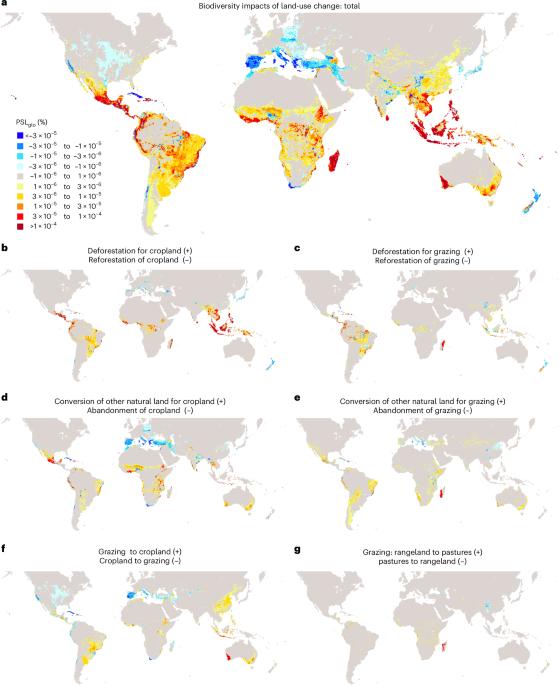Biodiversity impacts of recent land-use change driven by increases in agri-food imports
IF 25.7
1区 环境科学与生态学
Q1 ENVIRONMENTAL SCIENCES
引用次数: 0
Abstract
Land-use change such as the conversion of natural habitat to agricultural land has been a major driver of global biodiversity loss, prompting efforts at biodiversity restoration. However, restoration measures in certain areas can shift the detrimental biodiversity impacts elsewhere through the outsourcing of agri-food supply chains to biodiverse regions. This study examines the link between biodiversity impacts from land-use change and shifts in global supply chains from 1995 to 2022 by introducing a marginal allocation into multiregional input–output analysis. Almost 80% of recent global land-use change impacts were associated with increased agri-food exports from Latin America, Africa and Southeast Asia + Pacific (excluding China). Conversely, increased imports to China, the United States, Europe and the Middle East accounted for almost 60% of recent global land-use change impacts from a consumption perspective, despite decreasing domestic impacts through restoration. Decreasing biodiversity impacts in temperate and arid regions have been partially achieved by outsourcing agri-food supply to tropical biodiversity hotspots. This results in a cumulated global extinction rate (1.4% global potential species loss since 1995), exceeding the planetary boundary by about fifty times, thus highlighting the need for policies incentivizing habitat protection in tropical regions and sustainable sourcing in agri-food supply chains. Land-use change can lead to detrimental biodiversity impacts through the conversion of natural habitat to agricultural land. This study examines the association between biodiversity impacts from land-use change and global agri-food supply chains.

近期农业食品进口增加导致的土地使用变化对生物多样性的影响
土地用途的变化,如将自然栖息地转为农田,是全球生物多样性丧失的主要驱动因素,促使人们努力恢复生物多样性。然而,某些地区的恢复措施可能会通过将农业食品供应链外包给生物多样性丰富的地区,将有害的生物多样性影响转移到其他地区。本研究通过在多区域投入产出分析中引入边际分配,研究了 1995 年至 2022 年土地利用变化对生物多样性的影响与全球供应链转移之间的联系。近 80% 的近期全球土地利用变化影响与拉丁美洲、非洲和东南亚及太平洋地区(不包括中国)农业食品出口的增加有关。相反,从消费角度看,尽管通过恢复对国内的影响在减少,但对中国、美国、欧洲和中东的进口增加占近期全球土地利用变化影响的近 60%。温带和干旱地区生物多样性影响的减少部分是通过将农业食品供应外包给热带生物多样性热点地区实现的。这导致了累积的全球物种灭绝率(自 1995 年以来,全球潜在物种损失率为 1.4%),超出地球边界约 50 倍,从而突出表明有必要制定政策,激励热带地区的栖息地保护和农业食品供应链的可持续采购。土地使用的变化会将自然栖息地转化为农业用地,从而对生物多样性造成有害影响。本研究探讨了土地利用变化对生物多样性的影响与全球农业食品供应链之间的关联。
本文章由计算机程序翻译,如有差异,请以英文原文为准。
求助全文
约1分钟内获得全文
求助全文
来源期刊

Nature Sustainability
Energy-Renewable Energy, Sustainability and the Environment
CiteScore
41.90
自引率
1.10%
发文量
159
期刊介绍:
Nature Sustainability aims to facilitate cross-disciplinary dialogues and bring together research fields that contribute to understanding how we organize our lives in a finite world and the impacts of our actions.
Nature Sustainability will not only publish fundamental research but also significant investigations into policies and solutions for ensuring human well-being now and in the future.Its ultimate goal is to address the greatest challenges of our time.
 求助内容:
求助内容: 应助结果提醒方式:
应助结果提醒方式:


